With a striking poster design evoking the cosmic, sci fi and futurology, the just-concluded 11th international Theatre Festival Retroperspektywy (RPS), curated and organised by Teatr CHOREA at Fabryka Sztuki between 19-28 August, took as its title "The Beginning of a New World."
From feminist deconstructions of classic 19th century literature (director Joanna Lewicka's Bovary) to a bespoke children's show (Joanna Filarska and Paweł Głowaty's Sklep z dobrym humorem/A Good Humour Shop); a performance about inter-generational contact developed with the company's senior and youth groups (Złota Nić/Golden Thread); and a superb abstract art exhibition featuring the work of over 20 artists, the Festival's inclusive ethos and high standards were maintained, making for 10 days of artistic experimentation, intellectual and sensual stimulation, mischief, political subversiveness, surprises, and pure joy at 3 Tymienieckiego Street.
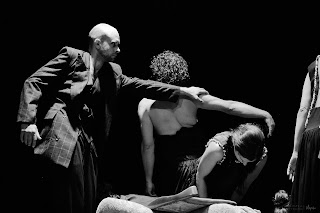 |
| Ragnarok |
 |
| Ragnarok |
Ragnarok, with its "Twilight of the Gods" title, develops its own aesthetic and attitude, though. Its hypnotic, dialogue-free 30 minute opening sequence presented Rodowicz, Janusz Adam Biedrzycki, Maja Caban, Joanna Chmielecka, Michał Jóźwik, Małgorzata Lipczyńska, and Anna Maszewska slowly making their way around the carpeted stage, as a tangled knot of pain: their bodies contorted, crawling, reaching out, mouths sometimes agape in silent screams.
 |
| Ragnarok |
If this haunting vision of collective distress gestured towards the horrors of the past two years - and those that are still ongoing - the show's evocation of a post-apocalyptic scenario remained intimate, interior and quite abstract. Clearly divided into differently toned sections, Ragnarok went on to show a social world being established (sandwiches made on stage were handed out to the audience) then fragmented, while a delirious dance interlude stripped set and performers, suggesting a bizarrely deconstructed club night. Tomasz Krzyżanowski's music, ranging from classical requiem to twitchy electronics, enhanced the immersive richness and unpredictability of the performance, which implicated the audience right up to the conclusion - and beyond, as bits of Marta Góźdź - El Bruzda's set - a carpet, a cup - greeted us at the exit.
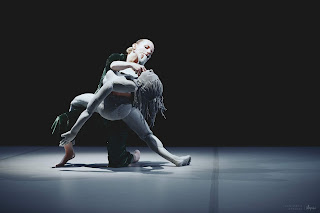 |
| Romans |
While ensemble work often defines CHOREA's performances and collaborations, solo shows by female performers also have an important place in the Festival, and have often proved particularly powerful. Following Akty (RPS 2019) and W zawieszeniu (Suspended) (RPS 2020), this year's programme included Romans (Love Affair), a monodrama performed and directed by Natalia Sakowicz from a script by Zuzanna Bojda.
 |
| Romans |
The versatile Michał Jóźwik featured again here as Lem's iconic recurrent hero Ijon Tichy, alongside a dynamically multi-roling Jarosław Tomica for a hallucinatory journey blurring reality and fantasy, one that was ludic but also freshly urgent in its thematic concerns, ranging from ecological disaster to war. Alongside Adamczyk and Miłosz Wójciuk's lighting, the contributions of on-stage musicians Jan Jaworski, Szczepan Pospieszalski, Joanna Szczęsnowicz, and Jan Tarkowski on strings, trumpet, and electronic instruments added substantially to the atmosphere, complementing Jóźwik and Tomica's great rapport.
 |
| Po drugiej stronie |
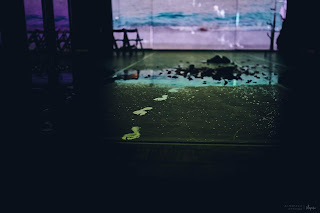 |
| Po drugiej stronie |
Philosophical statements delivered in rapid-fire direct address focused on issues ranging from freedom and seclusion to the audience's position in the theatrical event: "You are not individuals here. You are a plurality of persons...You are breathing in one and the same rhythm...the rhythm in which we are speaking." A particularly disturbing sequence evoked the dementing effects of random screen culture, but this dark night of the soul led to a cathartic coda, with the performers finally joining the audience for a shared moment of quiet contemplation of the natural world.
 |
| Oratnitza |
Of the several concerts featured in the programme, the two I saw, both performed in Fabryka Sztuki's Glass Hall, were highlights of the Festival. For those of us whose primary acquaintance with Bulgarian music is the contributions of Trio Bulgarka to Kate Bush records, the Saturday night concert by Oratnitza was nothing short of revelatory. Though reduced to four from their usual six-strong line-up (singer Ivan “Popa” Gospodinov and keyboardist Hristiyan Georgiev were absent due to illness), this superb band of young Bulgarian musicians gave their all in a thrilling performance combining tradition and modernity.
 |
| Oratnitza |
With extraordinary, earthy and ethereal vocal harmonies from Diyana Vassilevav and Asya Pincheva, drums heartily thwacked by Stefan Cekov, and Georgi Marinov establishing the didgeridoo and bagpipes as the coolest, funkiest instruments on the block, Oratnitza rocked like a tempest (appropriately, given the storm that started up during the show, with lightening flashes visible through the window behind the band). With Marinov constantly urging the audience to "come closer!", it didn't take long for the crowd to loosen up and dance, buoyed by the band's charisma and the infectious, cleansing energy of their music.
 |
| IMPERIUM DELENDA EST |
The following evening found an equally remarkable concert taking place in the Glass Hall. As a company, CHOREA has always maintained strong links with Ukrainian artists and these connections have only been strengthed throughout the ongoing war resulting from Russia's invasion. With a title referencing the Roman politician Cato the Censor's famed phrase "Carthago delenda est" ("Carthage must be destroyed"), Lesia Ukrainka Theatre's IMPERIUM DELENDA EST, directed by Dmytro Zakhozhenko, combined songs, poetry, projections, testimony and reportage in a viscerally powerful performance, the first large-scale work that the company have presented since the invasion and one which they have performed in bomb shelters in their home country. The tone was fierce, urgent and defiant, culminating in the proud unfurling of the Ukrainian flag.
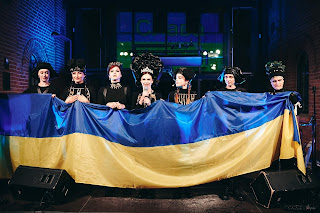 |
| IMPERIUM DELENDA EST |
In sum, the "New World" inaugurated and explored at Retroperspektywy 2022 was a brave one, avoiding cosy utopianism for more complex, questioning visions - and also offering a vital reminder of the vibrant richness of European cultural expressions still so often sidelined and suppressed by US cultural dominance.
As Rodowicz told Dariusz Pawlowski in interview: "Theatre, like few artistic activities, has a meeting space inscribed in it. It is a constant dialogue...In my opinion it has huge obligations...to protect the human in a person, to rebuild relationships between people. The most important thing today is that after leaving the theatre I want to take care of myself and the world at least a little." In their diverse ways, the best performances at RPS 2022 achieved that goal. Allowing "a plurality persons...to breathe in one and the same rhythm," the Festival opened its audience up to fresh ways of being, seeing, connecting and creating in our personal and collective futures.
Retroperspektywy Festival 2022 took place at Fabryka Sztuki between 19 - 28 August. Full details of the Festival programme are here.
Performance photos by: AGNIESZKA CYTACKA FOTOGRAFIA
Related reading:
Review of Powinniśmy być…Impresja na kilka czasowników (We Should Be...Impression on a Few Verbs
Review of Pretty Woman: The Musical (Teatr Muzyczny)
Łódź Film School Actor interviews:
Piotr Pacek
Anna Paliga
Paweł Głowaty
Ksenia Tchórzko
Karol Franek Nowiński
Matuesz Grodecki



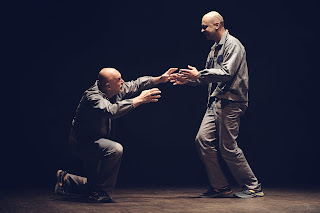

Thank you for this coverage in English! Polish theater is so inventive and this sounds like such a great festival. Do you know if some of the productions will go on tour?
ReplyDeleteI don't know about any specific plans but it's worth keeping an eye on the CHOREA website as they do sometimes tour, though mostly in Poland. IMPERIUM DELENDA EST has already been performed in France as well as Ukraine so you might have a chance to see that.
DeleteThanks for reading!